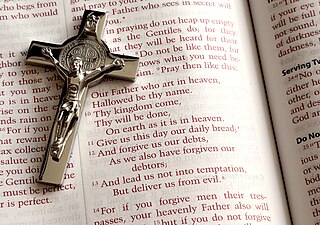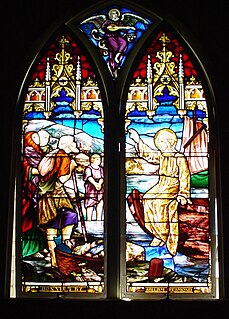Related Research Articles

Matthew 6:14–15 are the fourteenth and fifteenth verses of the sixth chapter of the Gospel of Matthew in the New Testament and is part of the Sermon on the Mount. These verses come just after the Lord's Prayer and explain one of the statements in that prayer.
Matthew 10:23 is a verse in the ninth chapter of the Gospel of Matthew in the New Testament.

Matthew 9:6 is the sixth verse in the ninth chapter of the Gospel of Matthew in the New Testament.
Matthew 9:11 is a verse in the ninth chapter of the Gospel of Matthew in the New Testament.
Matthew 9:13 is a verse in the ninth chapter of the Gospel of Matthew in the New Testament.

Matthew 10:3 is the third verse in the ninth chapter of the Gospel of Matthew in the New Testament.

Matthew 10:4 is the fourth verse in the ninth chapter of the Gospel of Matthew in the New Testament.
Matthew 11:30 is the 30th verse in the eleventh chapter of the Gospel of Matthew in the New Testament.
Matthew 9:17 is a verse in the ninth chapter of the Gospel of Matthew in the New Testament.

Matthew 9:25 is the 25th verse in the ninth chapter of the Gospel of Matthew in the New Testament.

Matthew 8:17 is the 17th verse in the eighth chapter of the Gospel of Matthew in the New Testament.
Matthew 8:20 is the 20th verse in the eighth chapter of the Gospel of Matthew in the New Testament of the Christian Bible. It reveals the Homelessness of Jesus and his followers.

Matthew 8:32 is the 32nd verse in the eighth chapter of the Gospel of Matthew in the New Testament.
Matthew 10:39 is a verse in the tenth chapter of the Gospel of Matthew in the New Testament.

Matthew 10:14 is the fourteenth verse in the ninth chapter of the Gospel of Matthew in the New Testament.
Matthew 10:16 is a verse in the tenth chapter of the Gospel of Matthew in the New Testament.

Matthew 10:27 is the 27th verse in the ninth chapter of the Gospel of Matthew in the New Testament.
Matthew 11:4-6 is a set of verses in the eleventh chapter of the Gospel of Matthew in the New Testament.
Matthew 12:17,18 are two verses in the twelfth chapter of the Gospel of Matthew in the New Testament.
Matthew 12:43-45 is a set of verses in the twelfth chapter of the Gospel of Matthew in the New Testament.
References
- ↑ Robert Witham, Annotations on the New Testament of Jesus Christ. Dublin: 1730.
- ↑ Cornelius Cornelii a Lapide; Thomas Wimberly Mossman The great commentary of Cornelius à Lapide, London: J. Hodges, 1889-1896.
- 1 2 3 4 5 6 7 "Catena aurea: commentary on the four Gospels, collected out of the works of the Fathers: Volume 6, St. John. Oxford: Parker, 1874. Thomas Aquinas".
 This article incorporates text from this source, which is in the public domain.
This article incorporates text from this source, which is in the public domain. - ↑ Block, Daniel I. (2001). "Handel's Messiah: Biblical and Theological Perspectives" (PDF). Didaskalia . 12 (2). Retrieved 19 July 2011.